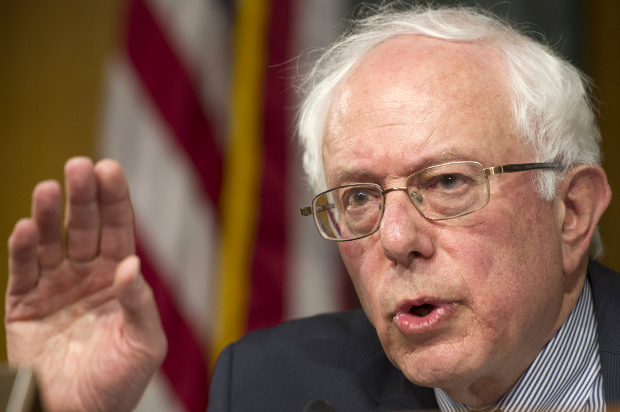In a new wide-ranging interview with The Nation, Democratic presidential candidate Sen. Bernie Sanders (I-VT) swears off campaign contributions from the fossil fuel industry, promises to visit red states like Alabama during his campaign, and finally tackles the issue of police brutality.
Sanders quickly pointed to the level of black teen unemployment to explain his campaign’s rise, and argued that amid soaring inequality, “the discontent of the American people is far, far greater than the pundits understand.” And Sanders finally addressed growing calls for his campaign to address police brutality and issues of race relations, acknowledging “that is a major issue that has to be dealt with. And we will deal with it, period.”
Sanders recalled his long history working on civil rights, “I got arrested in trying to desegregate Chicago’s school system,” but was quick to push back on the notion that his campaign has failed to address issues like race relations in favor of more populist economic rhetoric. “I do not separate the civil-rights issue from the fact that 50 percent of African-American young people are either unemployed or underemployed. ” Invoking Dr. Martin Luther King, Sanders said, “The issue that Dr. King raised all the time was: This is great if we want to desegregate restaurants or hotels, but what does it matter if people can’t afford to go to them? That’s still the issue today.”
And the Independent senator confronted the stigma surrounding his affiliation as a democratic socialist: “Do they think I’m afraid of the word? I’m not afraid of the word,” Sanders insisted before ticking off a list of “accomplishments” in Scandinavian countries like Denmark that have adopted a democratic-socialist approach, including tuition-free college, universal health care, and guaranteed paid maternity and paternity leave to argue that most Americans would support such measures:
I happen to believe that, if the American people understood the significant accomplishments that have taken place under social-democratic governments, democratic-socialist governments, labor governments throughout Europe, they would be shocked to know about those accomplishments. One of the goals of this campaign is to advance that understanding.
Sanders also proposed a bipartisan debate schedule, including a one-on-one debate with Republican Wisconsin Governor Scott Walker.
“The Republicans get away with murder because what they do and what they want is not seen, is not understood by the American people, because it’s not talked about,” Sanders exclaimed. His solution? Include Republicans in the Democratic primary debates, “I think the more that we can confront Republicans about their ideology of tax breaks for the billionaires and cuts to every program that is a benefit to the American people, and can expose them for their subservience to the billionaire class—I think that wins for us every single time … when we do that, the Republican agenda will be exposed for the disaster it is.”
“Let the Republicans defend why they want to give tax breaks to the billionaires and make massive cuts in Medicare. I would love to hear it,” he added.
But on nearly ever issue, Sanders was quick to point out the real cause of some of America’s issues, corporations:
On domestic surveillance:
Sanders reiterated his opposition to the Patriot Act but also criticized out the role of corporations in the surveillance state, “We have to recognize that corporations collect huge amounts of data on us.There is no question in my mind that technology is outpacing public policy in this area, and I do not think we should be casual about this or say that it’s something we should let the corporations figure out. We should all be talking about this—about how we’re going to maintain our privacy rights in very rapidly changing times.
On immigration:
Sanders blasted the “politics of division” from impeding real comprehensive immigration reform and allowing for the exploitation of undocumented workers, “we have to address that exploitation and end it. We also have to speak about who benefits from that exploitation: the same corporations that we see pushing these race-to-the-bottom policies … Look, the problem isn’t with this group of workers or that group of workers. The problem is with the corporations and the policies that make the exploitation possible.”
On net neutrality:
Sanders once again pointed to the controlling role of corporations and access to the internet, “This is about the free flow of information, the free flow of ideas, on the Internet. If we let corporations put a price tag on that, so that some ideas move more quickly than other ideas because a billionaire is paying for an advantage, that changes the debate in a way that harms democracy.”
On Hillary Clinton:
Sanders pushed back on calls to attack his Democratic opponent, saying, “That is the corporate media’s worldview. That is their only understanding of how a campaign can be run: when one candidate attacks the other candidate.”

